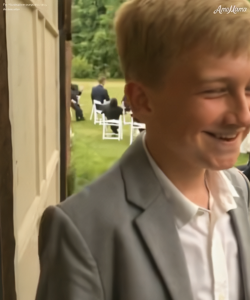
Whispers, Rumors, and a Missing Grandmother, The Heartbreaking Truth Behind the Silent Boy Next Door!
Tom was seventeen, with sharp, thoughtful eyes and a neat wardrobe that hinted at neatness rather than showiness. He never lingered in the hallways or joined the chatter by lockers; his world began and ended with school and home, a routine so simple it made him invisible.
His house sat on a quiet cul‑up in suburban Oregon, its white picket fence and orderly flowerbeds a testament to his grandmother’s care. Each afternoon after classes, they tended roses and tomatoes side by side, shading their faces from the sun but never exchanging more than a polite nod to passing neighbors.
Yet the day Mrs. Langford’s garden tools stayed unused, suspicion crept through the neighborhood like a chill. First, it was whispered that she’d fallen ill. Then came darker rumors: that Tom had harmed her, stolen her savings, or worse.
The relentless baseball gang who normally bellowed invitations—“Hey Tom, want to play?”—were suddenly forbidden by parents to so much as wave. Their gloves lay forgotten on driveways as they gave him a wide berth, eyes filled with fear instead of friendship.
Tom barely noticed. He continued walking home with his head down, sometimes returning late and vanishing altogether on a few especially still evenings. The sleek silver BMW parked in his driveway only intensified the gossip: how could a quiet boy afford such a car unless he’d robbed his own grandmother? Every hushed conversation about him felt like a razor against his spine, yet he refused to retaliate or explain. He simply accepted the scornful glances and the silent judgment.
Until one summer afternoon he pulled into his driveway and found Carter and two friends blocking the way. Their baseball gloves dangled awkwardly, their voices unsteady as they confronted him. “Tom,” Carter said, swallowing. “Our parents told us not to talk to you. They said… bad things.” Tom’s lips barely moved when he answered, “I’ll show you the truth.” He unlocked his car door and motioned them inside.
They rode in tense silence past gas stations and strip malls until the road narrowed into tree‑lined streets. Tom guided them to Golden Hills Senior Living Center, its façade bright in the late‑day sun. Inside, the air smelled of lavender polish and fresh cookies. Residents dozed in armchairs, while nurses smiled and greeted him by name. In a sunny corner, knitting needles clicked in rhythm with a soft melody. There sat Mrs. Langford.
“Grandma!” Tom breathed, and her eyes lit up like lanterns. She set aside her pale green scarf and beckoned him close. Behind them, the three boys hovered, mouths agape.
“My parents left me when I was four,” Tom began, voice low. “She’s not my birth grandmother. She chose to raise me when I had nowhere else to go.” He glanced at her, pride warming his chest. “Last year she got sick. I couldn’t just leave her alone, but I couldn’t skip school either. So I started volunteering here after class.” He nodded toward the staff. “She insisted I take the car so I wouldn’t have to bike back at midnight.” The boys exchanged looks, their world shifting on its axis.
One by one, they followed Tom as he introduced them around: to Mr. Henderson, who had fought in Korea and loved chess; to Mrs. Patel, whose stories of raising nine children drew peals of laughter; to nurses who shared chocolate‑chip cookies and kind words. They helped water potted geraniums, pushed wheelchairs through sunlit gardens, and listened as the elders reminisced about dances, first loves, and dreams that glittered long ago.
When they finally left, the night air felt different—lighter somehow. Parent calls went from warnings to apologies as the boys recounted the real story. Within days, every gossip had vanished. Neighbors greeted Tom with smiles instead of stares. On weekends he joined pick‑up games in the street; he helped Mr. Dean fix a fence and carried groceries for Mrs. Valdez, trading silence for friendship at last.
Tom, who once moved like a shadow, now walked with the quiet confidence of someone who’d been seen and understood. And though his lips still opened only when necessary, his presence no longer scared people—it comforted them. Because in learning Tom’s secret, they discovered a simple truth: the people who say the least often have the most extraordinary stories to tell, if only given the chance.




